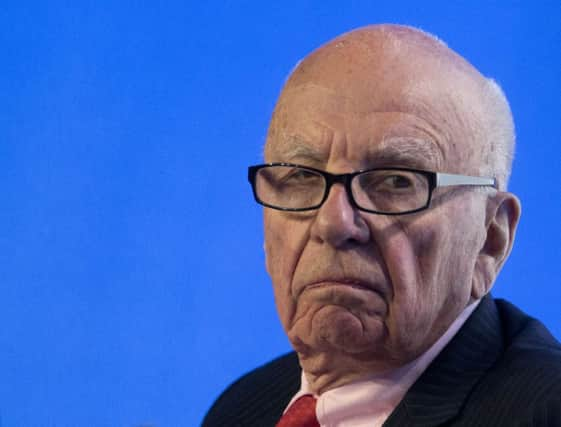Page 3 models face axe, signals Rupert Murdoch


The decades-long feature of page three may soon be forced to cover its modesty after the owner of the tabloid’s parent company suggested it felt “old-fashioned” in the 21st century.
Mr Murdoch hinted that although some readers approved of the staple, which features full-length photographs of topless glamour models, the days of showing women’s breasts may be numbered.
Advertisement
Hide AdAdvertisement
Hide AdIn comments on social media, the executive chairman of News Corp appeared to signal a significant makeover – or rather, dressing up – of the feature, a fixture in the Sun since November 1970.
It follows an increasingly loud chorus of criticism from women’s rights groups over the publication’s decision to continue printing the photographs, with a petition calling for an end to the practice amassing hundreds of thousands of signatories.
The No More Page 3 campaign, which has the support of a growing cross-party group of politicians, said Mr Murdoch’s comments were “encouraging”, but added that he appeared to have “missed the point” of the debate in some of his remarks.
One former page three model told The Scotsman the pictures were harmful to young women, given the way they promoted a “false body image”, and said she hoped it would be discontinued.
Writing on Twitter, Mr Murdoch said he was keen to take counsel from the public when deciding the future, if any, of page three.
When not reflecting on the advantages and disadvantages of Scottish independence – an issue on which he is proving increasingly vocal – the 83-year-old mused: “Brit feminists bang on forever about Page 3. I bet never buy paper. I think old-fashioned but readers seem to disagree.”
He went on: “Page 3 again. Aren’t beautiful young women more attractive in at least some fashionable clothes? Your opinions please.”
The newspaper’s editor has defended the controversial feature in the past, saying women readers fully support it. Last year, David Dinsmore said on radio he was “standing [his] ground” despite pressure from politicians, anti-sexism campaigners and student bodies.
Advertisement
Hide AdAdvertisement
Hide AdThe Scot said: “I think that it is a lively issue for people who don’t buy the paper and we’ve done the research, done the focus groups, and in many ways listened to the campaigners to ask, ‘What does it mean to our readers?’ The result comes back a resounding, ‘Keep it there, don’t take it away’.”
Lucy-Anne Holmes, one of the campaigners behind the No More Page 3 organisation, said: “Brit feminists banging on about page three have made Murdoch and the Sun realise that the rest of the country isn’t down with their 1970s sexism, not that sexism was ever OK.
“What is also really encouraging is the overwhelming response Murdoch got from people all across the country who think that page three is sexist and needs to go. His tweets certainly show that he’s reconsidering the future of page three.”
She added: “We’re not going to lie, though – it’s unfortunate that he misses the point entirely by asking a question about whether young women are more attractive clothed or unclothed. But we’re really encouraged that change is afoot.”
Susie Flashman Jarvis, a counsellor who posed topless for the Sun in the mid 1970s, said the feature was an anachronism.
“A lot of the models aren’t mature enough to appreciate the impact of what they are doing. I know if I was in the same position, I wouldn’t have done it,” she said.
“Page three creates a false body image for young women and gives them false messages about what a woman should be and look like. A woman’s self-worth consists of more than her breasts.”
The decision over whether page three continues is likely to rest with Mr Murdoch, who has long been known to exert a powerful influence over the editors of his newspapers.